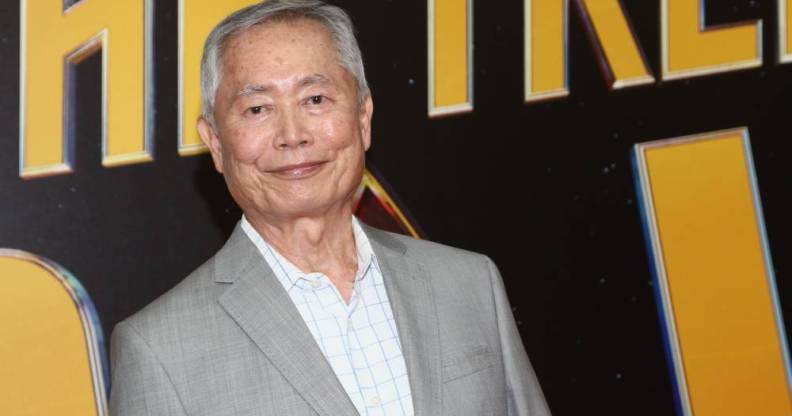Star Trek icon George Takei describes ‘guilt and torture’ of being closeted

George Takei attends the Paramount+’s 2nd Annual “Star Trek Day” Celebration at Skirball Cultural Center on 8 September 2021. (Tommaso Boddi/WireImage)
Star Trek star George Takei has opened up about the “torture” of hiding his sexuality in the face of his parents’ strength fighting injustice.
Takei, who played lieutenant Hikaru Sulu on the original series, recalled the terror of his family being sent to a Japanese-American internment camp during an interview with the Telegraph.
The actor and activist described how his father walked into his bedroom when he was five to say that the family was “going to have to move”.
While he was waiting in the front room with his younger brother, Takei recalled seeing “two soldiers” carrying “rifles with shiny bayonets on them” “marching up our driveway”.
The Takeis were moved between several internment camps before eventually being taken to the infamous camp in Tule Lake, California.
The internment camps were established during the Second World War by president Franklin D Roosevelt. From 1942 to 1945, it was the policy of the US government that people of Japanese descent – including US citizens – be incarcerated in the camps.
People who were labelled as dissidents were forced into the prison camp at Tule Lake. Japanese-American prisoners at the camp began striking over food shortages and unsafe conditions that led to a death in October 1943.
The US army deployed tanks and soldiers to Tule Lake to counter the protests.
George Takei told the Telegraph that people forced into the internment camps were required to take a “loyalty questionnaire”, but his parents refused to consent to the oath as they “never had any allegiance to Japan”.
He said his family was moved to the Tule Lake camp because his parents stood their ground.
Takei revealed in 2005 that he was gay and had been in a long-term relationship now husband Brad Altman. But he said it was “torture” for him to remain silent about his sexuality for decades in the face of his parents’ bravery.
“It was torture being closeted because my instinct was to speak out,” he said. “My parents had stood their ground on the loyalty questionnaire. They were principled.”
Takei continued: “And so I felt an immense sense of guilt in not standing up.
“Especially when I was standing up on other grounds – certainly on the internment of Japanese-Americans.”
In 1981, George Takei testified in a hearing before the Commission for Wartime Relocation. He called for redress for Japanese-Americans who had been forced into the internment camps.
Takei said there has been “amazing progress” in recent years on “telling the LGBTQ story and having LGBTQ performers now acting and maintaining a career”. However, he said that there are still glaring issues that remain.
“But… there’s always that ‘but’, in Hollywood and in America,” he said. “Issues still remain.”

